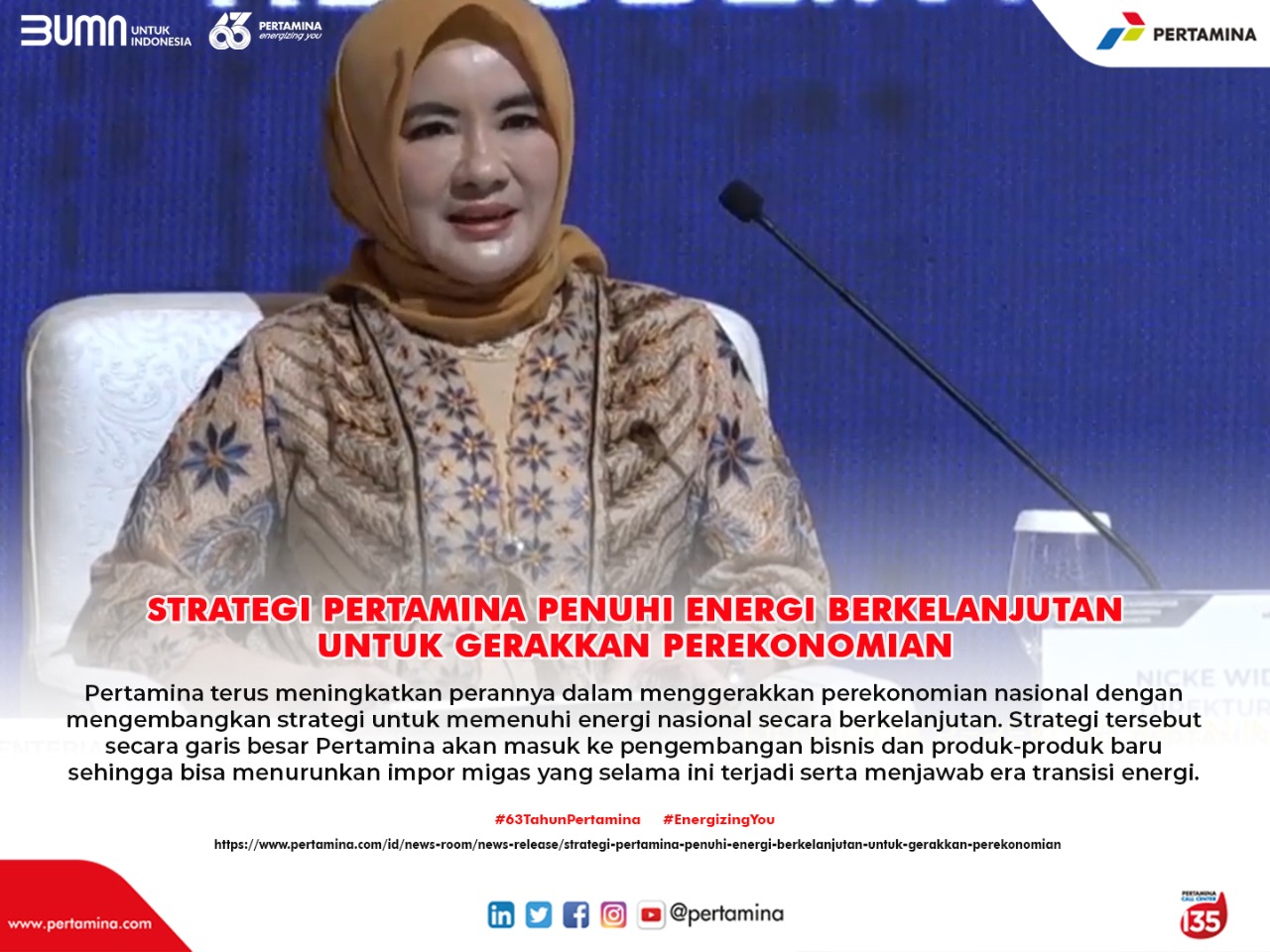
Pertamina's Strategy to Fulfill Sustainable Energy to Move the Economy
Jakarta, December 23, 2020 - PT Pertamina (Persero) continues to increase its role in driving the national economy by developing strategies to meet national energy sustainably to reduce oil and gas imports.
This strategy was revealed by President Director of Pertamina, Nicke Widyawati, in the Indonesian Economic Outlook Forum entitled "Reaching Opportunities for Economic Recovery in 2021," which took place in Jakarta, Tuesday (22/12).
President Director of Pertamina, Nicke Widyawati, explained that the grand national energy strategy was developed from the Government's plan to realize national energy security as stipulated in Peraturan Pemerintah No. 79/2014 regarding national energy policies. Currently, Indonesia's position is still in a score of 6.57 or Hold status.
"This is a challenge for how we can improve the position again to be Very Resistant. It is what underlies the Government to formulate a grand national energy strategy," she said.
Furthermore, Nicke explained that with a vision to realize national energy security, the challenge is to increase oil and gas production, reduce oil and LPG imports, and build infrastructure for both oil and gas and electricity. Of these three things, the Government compiled 11 programs, most of which aim to reduce imports and maximize by processing natural resources widely owned by Indonesia.
As a state-owned enterprise in the energy sector, Pertamina is responsible for running the program by increasing crude production by 1 million BOPD and acquiring foreign oil fields for refinery needs. This mandate must be carried out. Currently, Pertamina's contribution is 40%, next year, it will reach 60%, so this will be very dominant.
"With the role of SOEs to encourage national energy growth drivers, Pertamina's investment in the future will certainly be adjusted to the Government's grand energy strategy in the future. If we talk about upstream energy, 60 percent of the investment will be made in upstream energy," added Nicke.
Nicke added that Pertamina also increased refinery capacity to optimize fuel products and improve the quality of fuel and naptha. To anticipate the decline in demand for fuel, Pertamina has integrated petrochemical refineries, considering that Petrochemical is still importing 70%.
Then, to answer the energy transition era, Pertamina will accelerate EBT generators' use (PLTS domination) and increase biofuel production (biodiesel or bio hydrocarbons). According to him, the future energy transformation is towards new and renewable energy. Following the Government's direction, Biodiesel will continue to be developed in the future so that we can optimize the abundant palm oil in Indonesia.
"Apart from having to do exploration from the oil and gas side, we will also increase bioenergy contribution. After Biodiesel (B30), next year will enter B40, Pertamina will also enter Biogasoline which needs quite high," she said.
From the gas side, continued Nicke, Pertamina will also develop gasification from abundant coal energy into DME to convert LPG. Also, Pertamina continues to build and add household gas networks to reach 3 million customers. Therefore, people can choose between LPG, DME, Jargas, or electric stoves, which will make the economy more rotating.
Nicke emphasized that, in general, Pertamina will enter into business development and new products to fill the gap to reduce oil and gas imports that have been happening so far. Pertamina also runs a mandatory program related to subsidized fuel such as One Price Fuel in 243 points in the 3 T area (Disadvantaged, Frontier, and Outermost). For equal access to non-subsidized products, Pertamina has prepared Pertashop at 2,192 points.
This mini outlet program involves MSMEs in collaboration with the Ministry of Home Affairs, the Ministry of Cooperatives and SME, and the Ministry of Villages, Development of Disadvantaged Areas, and Transmigration.
"We hope to become a driver for the regional economy. One of our commitments, even in a pandemic condition, all business activities, all Pertamina's assets are still operated. Because there are 1.2 million workers in Pertamina's ecosystem, which is an enormous amount, therefore, this motor must not be stopped. It has become the company's mission to keep business moving to absorb workers and continue to encourage the movement of the national industry," concluded Nicke.**